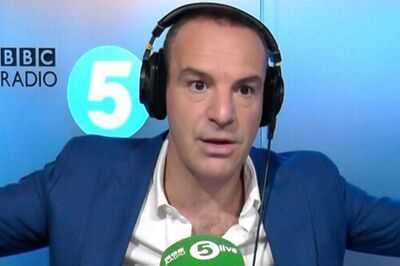
The latest energy price cap kicks off on October 1 and will run until December 31. For a typical household using Direct Debit, the fresh price cap will stand at £1,755. The forthcoming 2% rise means energy bills will climb by £2.93 a month or £35.14 per year compared to the previous price cap period.
This shift will weigh on people's minds as temperatures drop, with many pondering what they should do about their energy credit after months of warm weather. Martin Lewis offers some useful guidance to people who are uncertain what to do now that autumn has arrived and ahead of the price cap, including checking how much energy credit you currently have.
"Energy credit" relates to the scenario where you've paid your energy provider more than what you've used, meaning it owes you some money back. This is typical with Direct Debit schemes, where your monthly payments are based on estimated annual energy usage.
Building up a bit of credit during the milder months when consumption is lower can help offset the heightened energy use during the chillier winter months. If you have a substantial credit balance, you can always request a refund from your supplier, reports the Manchester Evening News. You can also ask your supplier to reduce your Direct Debit amount if you're consistently paying more than what you actually consume.
This was the subject of discussion in the latest episode of The Martin Lewis 'Question Time' Podcast, titled 'How to get energy credit back'. A caller named Craig asked Martin what he should do about the £700 credit in his mum's account, including whether he should ask for the credit as a refund or register with a different supplier.
He asked the Money Saving Expert founder: "My father recently passed away. I've been trying to help my mum sort out a lot of the finances and bills, and one of them is the electricity bill, which was in both their names with EDF. It has got about £700 in credit, it is standard variable - I didn't know that, but thanks to you, I do know that.
"I am looking at the options because on one hand she would like to keep that credit because she is worried about a cold winter, but on the other hand, I'm thinking, is it best to get that credit out and look for another deal because I know the new fix contracts are coming up very shortly?"
'Should I get an energy credit refund?'Martin responded by telling the caller he believes the question should be split into two separate points - the credit, and which provider she should choose. "So, the first thing to say is we are at this time of year, this is the point where you should be in the maximum credit direct debit cycle.
"If you think about it, what you do is, as you go through the warmer months, from around May onwards, because you are using less, you build up your credit - a monthly direct debit is where you pay a fixed amount across the year, but it is meant to smooth out this.

"But, you are building up credit during the summer months because it is warm and you're using less energy, and you use it up during the winter months. November is the split point in winter. November is the point where you tend to be at your absolute maximum credit. We're only a month away from that.
"So, at this point of the year, if you have a couple of months' worth of credit - and exactly what you have depends on when you started - that's not a bad thing. So, the problem I have now is I need to know what her typical monthly payment is." The caller revealed: "She is only paying around £55 a month, but according to her latest bill, she has been charged £150 a month."
Martin responded: "The direct debit is wrong in the first place, but let's just go on that £150 a month and say she is using £150 worth of energy. In that case, in this time of year, I would not be worried about her having £300 worth of credit - two direct debit months for her.
"Everything above that, I think, should be in her bank account rather than in the energy firm's bank account. So, that is the first principle I'd give you - at this time of year, having a couple of months' worth of credit, nothing more."
'Should I switch to a different energy provider?'In response to a query about whether the caller's mum should stick with her current energy supplier, Martin advised: "Should she stay with EDF? Well, the first question we ask is, 'is her tariff good?' The answer is quite simply 'no'. She is on a price-capped tariff, which means it is dictated by the regulator Ofgem, and the price cap is one I call the 'pants cap'.
"It is going to go up by 2% on October 1, and the current predictions are that it might come down a tiny bit in January and more in April. So, this time next year, she will probably be paying slightly more than she is right now. Contrast that to the cheapest contract fixes on the market, which are around 13% cheaper than what she is paying right now. And that means to me that she should be on a fix.
"Your question is that she wants to stay where she is, so she has a couple of choices. If she moves companies, she should automatically get all her credit back. They will do a final meter reading, unless she is on a smart reader, when it will be automatic. They will calculate how much she is owed, and she should get that money back within a month.
"Alternatively, if she stays where she is, she can get in touch with EDF and say 'look, I only want a couple of months' worth of credit, I would like £400 back', it will be a bit of negotiation and they should give her some of that credit back and she stays into credit. So it isn't really material to your choice, if you know what I mean, whether she moves or doesn't move."
Wrapping up his advice, Martin stated: "Get off the price cap, move onto a fix, either with EDF, if you want it for comfort, or if you want the very cheapest, go to a price comparison site. But, either way, if she is only using £150 worth of energy a month, across a year on average, then she has got too much credit and she should want a couple hundred of that back."
Martin Lewis advises that households paying their energy bills through Direct Debit should check their accounts in May or November. They should ensure their credit balance doesn't go beyond roughly a month and a half of their monthly payments, which he reckons should be approximately £300 maximum.
Should your credit balance be significantly higher than this figure, you can demand a refund from your energy provider. If they refuse your request, you have the right to escalate the issue to the Energy Ombudsman.
Getting energy credit backReclaiming energy credit, Martin outlined how numerous people overpay their energy bills through Direct Debit, accumulating credit with their provider. For example, maintaining a positive balance because actual consumption has been lower than the estimated/debited sum.
He suggests regularly providing precise meter readings so that the supplier's projections match genuine usage. Without this, the credit can accumulate without your awareness. If you have credit, you can request your energy supplier to reimburse the excess. Alternatively, you can retain the credit to balance future bills.
Figures and examples| Item | Value/example |
Notes |
Total credit held by customers |
~ £3 billion |
This is roughly how much UK energy firms are estimated to be holding in over-credit across households paying by Direct Debit. |
Average credit per household |
~ £178 |
That’s the average amount people are in credit by, according to recent estimates. |
Thresholds for “too much credit” |
Over 1.5 months of Direct Debit is likely too much, or credit of £200-£300 or more should trigger action. |
|
Real case |
Someone had £1,000 in credit with EDF, asked for a refund, succeeded. |
The time of year is crucial. May often sees the lowest credit or highest debt - an ideal time to check. If you discover that your credit exceeds one month's Direct Debit amount (particularly around May), it's a strong indication to request a refund. If your credit significantly surpasses £200-£300, it's worth pressing the supplier for a refund.
Key adviceEnsure your meter readings are current. This helps prevent overestimating your usage (and thus overpaying). Also, review your Direct Debit payments. Check if they're too high, especially if you have credit accumulating. You might be able to lower payments or ask for a refund.